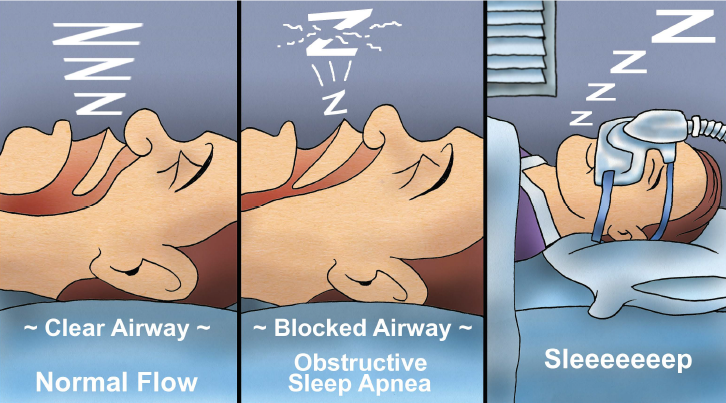Have you been told you snore loudly and often? Do you ever stop breathing or have difficulty catching your breath during sleep? Do you find yourself becoming sleepy or actually falling asleep while doing tasks that are somewhat sedentary? If you answered yes to any of these questions, it may be time to have a discussion with your doctor. There is help available for those wanting to improve their quality of sleep.
Snoring often disturbs breathing during sleep. It happens when tissues of the upper airway vibrate as we breathe. Snoring can be bothersome, but isn’t as concerning as apnea. Apnea is a word found in the Greek language meaning “no breath”. It refers to those times when breathing completely stops.
These troublesome events can last 10 seconds up to several minutes. It occurs when the tissues of the upper airway – the tongue, soft palate, and uvula – collapse and disrupt normal airflow. There may be an effort to breathe, with the chest and abdomen moving, but air is not moving past the obstruction in the throat. When the flow of air is blocked, the blood’s oxygen levels drop. The brain’s sensors recognize that inadequate breathing is occurring partly because of the increased levels of carbon dioxide. The body responds to this alarming situation by releasing a burst of cortisol hormone. This stress response increases heart rate and blood pressure. If apnea is allowed to continue unchecked, serious problems can develop.
Shift work may result in the worsening of existing health conditions and this is certainly true when it comes to quantity and quality of sleep. Shift Work Sleep Disorder affects people who frequently rotate shifts or work at night. At least 20% of the US workforce works this type of schedule. Shift work schedules may lead to a repeated or ongoing pattern of interrupted sleep unless the employee is very intentional about getting the necessary sleep required for good health.
There are ways to cope with the challenges of getting adequate sleep, and avoiding health problems, while doing shift work.
- First and foremost, get a medical screening and talk with your doctor about concerns you have regarding sleep disorders.
- Regular mealtimes help regulate your body clock. Eat small, light meals at night when your metabolism is sluggish.
- Naps are key to maintaining alertness. Try a 20-minute nap when you feel sleepy. Napping before reporting for night shift can be very helpful for staying alert on the job.
- Stay on a regular sleep schedule every day of the week, even on days off.
- Taking the supplement melatonin can help you fall asleep whether day or night. Check with your doctor first.
- Make sure your bedroom is conducive to sleep. De-clutter, darken, and soundproof your room.
- Avoid caffeine and nicotine within four hours of your desired bedtime.
Make quality sleep and good health your priority number one!
MANAGING FATIGUE EDUCATIONAL PROGRAM | Scarlet Knight © 2019 Please Distribute to Others.




